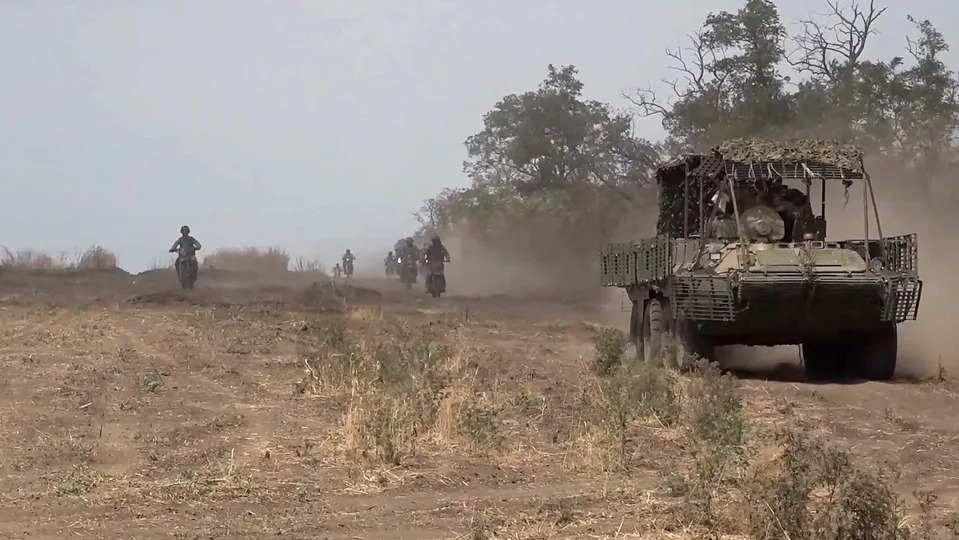Ukraine says it hit four Russian air bases in major drone attack

Ukraine said on Wednesday it carried out its largest long-range drone strike of the war on four Russian military airfields overnight, which were hailed by President Volodymyr Zelenskiy as "timely" and "accurate".
The General Staff said on Telegram that air bases "Khalino", "Savasleyka", "Borisoglebsk" and "Baltimor" in Voronezh, Kursk and Nizhniy Novgorod regions were hit.
"The main targets were warehouses of fuel and lubricants and aviation weapons," it added, saying the results of the attack were being clarified.
A Kyiv security source said the strike aimed to undermine Moscow's ability to use warplanes for gliding bomb attacks on Ukraine.
Reuters could not independently verify the claim. Ukraine was still assessing the scale of damage, the source said.
"Thank you for the accurate, timely, and effective strikes on Russian airfields. Ukrainian drones work exactly as they should," Zelenskiy said as he addressed the military on Wednesday.
Russia's defence ministry said earlier that its air defences had destroyed 117 drones and four tactical missiles launched by Ukraine at several regions including Kursk.
The strike on the airfields comes as Ukrainian troops are trying to press forward in Russia's Kursk region after they launched a surprise operation which has yielded their biggest battlefield gains since 2022.
Since the incursion last week, Russian forces has reduced the number of guided bomb attacks on border settlements in Ukraine's northeastern Kharkiv region, the local governor said on Monday.
AfriPrime App link: FREE to download...
https://www.amazon.com/Africircle-AfriPrime/dp/B0D2M3F2JT
Ukraine said it shot down a $36 million Su-34 bomber jet inside Russia
-
Ukraine downed a Russian Su-34 fighter jet over Kursk amid an ongoing territorial push.
-
The Su-34, worth around $36 million, is Russia's most efficient fighter bomber with advanced tech.
-
Ukraine has previously held long kill streaks with Russian Su-34s.
Ukraine said its military downed one of Russia's most expensive fighter jets over Kursk more than a week after a surprise attack on the region.
"Defense forces of Ukraine destroyed the enemy Su-34. The sky over Kurshchyna became clearer," Ukraine's General Staff wrote in a Telegram post on Wednesday.
Video footage of what appears to be fire and debris from the downed jet is circulating on social media and was cited in a Newsweek story. Business Insider could not independently verify the video.
The Su-34, also known as the Fullback, is worth around $36 million, The Kyiv Post reported.
It is considered Russia's most efficient fighter bomber. It has sensors, avionics, and smart weaponry that enable it to identify targets quickly, Forbes previously reported.
Ukraine has previously held long kill streaks with Russian Su-34s. In February, the Ukrainian military said it shot down four Su-34s in one week and a total of 10 Russian fighter jets in 10 days.
It comes as Ukraine's push into Russian territory continues. As of Wednesday, 74 settlements are under Ukraine's control, according to the military's commander in chief Oleksandr Syrskyi.
The invasion began on August 6, prompting a state of emergency in the region.
The mission was kept secret — even from members of the Ukrainian military. The New York Times reported that a research institute affiliated with the military had analyzed the most successful operations in modern history and found those with the best outcomes were kept private.
Speaking to The Times, an unnamed Ukrainian deputy brigade said most senior officers were only given three days' notice before the invasion took place, while soldiers in non-leadership roles were only given one day's notice.
Representatives for Ukraine's Armed Forces and Russia's Ministry of Foreign Affairs did not immediately respond to requests for comment.
AfriPrime App link: FREE to download...
https://www.amazon.com/Africircle-AfriPrime/dp/B0D2M3F2JT
Russia says it thwarted a Ukrainian charge to expand its incursion. Kyiv says it won't occupy land
Russia said Tuesday that its forces checked an effort by Ukrainian troops to expand a stunning weeklong incursion into the Kursk region, as a Ukrainian Foreign Ministry spokesperson said Kyiv has no intention of occupying Russian territory.
Russian army units, including fresh reserves, aircraft, drone teams and artillery forces, stopped Ukrainian armored mobile groups from moving deeper into Russia near the Kursk settlements of Obshchy Kolodez, Snagost, Kauchuk and Alexeyevsky, a Russian Defense Ministry statement said.
Meanwhile, Ukrainian Foreign Ministry spokesperson Heorhii Tykhyi said the cross-border operation was aimed at protecting Ukrainian land from long-range strikes launched from Kursk.
“Ukraine is not interested in taking the territory of the Kursk region, but we want to protect the lives of our people,” Tykhyi was quoted as saying by local media.
He said Russia had launched more than 2,000 strikes from the Kursk region in recent months using anti-aircraft missiles, artillery, mortars, drones, 255 glide bombs and more than 100 missiles.
"The purpose of this operation is to preserve the lives of our children, to protect the territory of Ukraine from Russian strikes,” he said.
The commander of the Ukrainian military, Oleksandr Syrskyi, said in a video posted Tuesday to President Volodymyr Zelenskyy’s Telegram channel that Ukraine now controls 74 settlements in the Kursk region.
Ukrainian troops have continued to advance, gaining control over 40 square kilometers (15 square miles) of territory in the past 24 hours, Syrskyi said.
“Fights are ongoing along the entire front line. The situation, despite the high intensity of combat, is under control,” he added.
Ukraine’s Western partners have said the country has the right to defend itself, including by attacking across the border. Polish Prime Minister Donald Tusk said Tuesday that he backed the Ukrainian operation, though he said Kyiv officials did not consult him about it beforehand.
Russian military actions in Ukraine bear "the hallmarks of genocide, inhumane crimes, and Ukraine has every right to wage war in such a way as to paralyze Russia in its aggressive intentions as effectively as possible,” Tusk said.
Kremlin forces intensified their attacks in eastern Ukraine. Ukraine’s General Staff said Tuesday that over the previous 24 hours, Russian troops launched 52 assaults in the area of Pokrovsk, a town in Ukraine’s Donetsk region that is close to the front line. That's roughly double the number of daily attacks there a week ago.
Ukraine's shorthanded army has struggled to hold back the bigger, better-equipped Russian forces in Donetsk.
The Ukrainian military claims that its charge onto Russian soil that began Aug. 6 has already encompassed about 1,000 square kilometers (386 square miles) of Russian territory. The goals of the swift advance into the Kursk region have been a closely guarded military secret.
Analysts say a catalyst may also have been Ukraine’s desire to ease pressure on its front line by attempting to draw the Kremlin’s forces into defending Kursk and other border areas. If so, the increased pressure around Pokrovsk suggests Moscow did not take the bait.
Ukraine’s ambitious operation — the largest attack on Russia since World War II — has rattled the Kremlin. It compelled Russian President Vladimir Putin to convene a meeting Monday with his top defense officials.
Apparently, Ukraine assembled thousands of troops — some Western analysts estimate up to 12,000 — on the border in recent weeks without Russia noticing or acting.
About 121,000 people have been evacuated from Kursk or have fled the areas affected by fighting on their own, Russian officials say. The Institute for the Study of War, a Washington-based think tank, said it has seen geolocated footage indicating that Ukrainian forces advanced as much as 24 kilometers (15 miles) from the border.
The Russian Defense Ministry appeared to support that claim when it said Tuesday it had also blocked an attack by the units of Ukraine's 82nd Air Assault Brigade toward Maryinka, which is about that distance from Ukraine.
Russian state television on Tuesday showed residents from evacuated areas lining up in buildings and on the street to receive food and water. Volunteers were pictured distributing bags of aid, while officials from the country’s Ministry of Emergency Situations helped people, including children and older people, off buses.
“There is no light, no connection, no water. There is nothing. It’s as if everyone has flown to another planet, and you are left alone. And the birds stopped singing,” an older man called Mikhail told Russian state television. "Helicopters and planes fly over the yard and shells were flying. What could we do? We left everything behind.”
A motive behind Ukraine’s bold dive into Russia was to stir up unrest, according to Putin, but he said that effort would fail.
The successful border breach also was surprising because Ukraine has been short of people at the front as it waits for new brigades to complete training.
Dara Massicot, an analyst at the Carnegie Endowment, said the Ukrainian breakthrough was a smart move because it exploited gaps between various Russian commands in Kursk: border guards, Ministry of Defense forces and Chechen units that have been fighting on Russia's side in the war.
Russian command and control is fractured in Kursk, Massicot said on X late Monday.
The Ukrainian Army's General Staff announced Tuesday that it was establishing a 20-kilometer (12-mile) restricted-access zone along Russian-Ukrainian border in the northeastern Sumy region, which borders Kursk.
The measures were introduced because of the increasing intensity of combat in the area and the rising presence of Russian reconnaissance and sabotage units there, a statement said.
AfriPrime App link: FREE to download...
- Questions and Answers
- Opinion
- Story/Motivational/Inspiring
- Technology
- Art
- Causes
- Crafts
- Dance
- Drinks
- Film/Movie
- Fitness
- Food
- Games
- Gardening
- Health
- Home
- Literature
- Music
- Networking
- Other
- Party
- Religion
- Shopping
- Sports
- Theater
- Wellness
- News
- Culture
- War machines and policy



